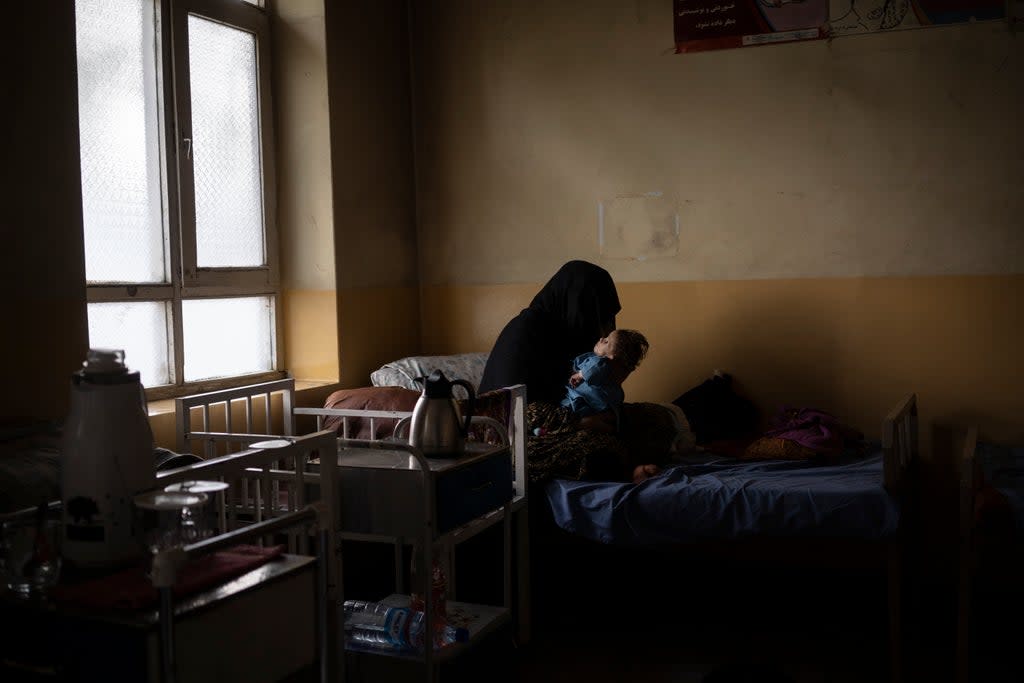Taliban in Afghan provinces enforce ‘far harsher rules’ against women than advised by Kabul leaders

Members of the Taliban ruling Afghanistan’s provinces are using a manual with far stricter and more abusive rules against women than the policies outlined by the Taliban leaders based in Kabul, a leading human rights organisation warned.
Human Rights Watch said the manual was established by the Taliban’s Ministry of Vice and Virtue – a government department which was a “notorious symbol of abuse”, especially against women and girls, when the Taliban previously ruled the country from 1996 to 2001.
Researchers said the Ministry of Vice and Virtue is in the building where the Ministry of Women’s Affairs was located, until the Taliban recently got rid of the department.
The Taliban swept to power in mid-August as the US and other Western troops withdrew. The last time the hardline Islamist group ruled the country women were barred from working, girls were blocked from going to school, and women had to be chaperoned by a male relative if they wanted to leave the house. While there were reports gay men had been stoned to death in formal executions.
“It barred women from educating girls in home-based schools, from working, and from begging,” researchers said of the Ministry of Vice and Virtue during the Taliban’s previous rule in the 1990s.
“It enforced draconian restrictions on women and men through public beatings and detention. Ministry officials beat women publicly for dress deemed ‘immodest’; showing their wrists, hands, or ankles; and not being accompanied by a close male relative. The officials beat men for trimming their beards.”
While the current manual predominantly lays out rules against “vice”, it also includes stringent rules on the behaviour of women and girls.
“It instructs religious leaders to teach people about which male family members can act as a mahram (a chaperone) for women and older girls and states that women ‘shall be commanded to put on a veil when faced with non-mahram,’” campaigners at Human Rights Watch said. “Another provision states: ‘Women shall be prohibited from not wearing hijab and veil in public and against non-mahrams’.”
The Taliban issued the manual back in 2020 before publishing an amended version in February 2021 when it was beginning to oversee increasing parts of Afghanistan. The manual has been used by the ministry in several provinces since the Taliban seized Kabul in August, Human Rights Watch said.
Heather Barr, associate women’s rights director at the charity, said: “The Taliban have tried to reassure the world that they respect human rights, including the rights of women and girls. But the rules instructing their officials are a patchwork of abusive policies enforcing gender and LGBT discrimination, and harsh repression of autonomy and free expression.
“The Taliban’s world view and abusive practices have been relatively consistent, as this manual demonstrates. Countries that spent the last 20 years promoting human rights in Afghanistan need to negotiate with the Taliban to try to end worsening rights violations, including against women and girls.”
While secondary schools have reopened for boys in Afghanistan, they are still shut for the overwhelming majority of girls.
Ms Barr said: “Women are banned from most employment; the Taliban government added insult to injury by saying women in their employ could keep their jobs only if they were in a role a man cannot fill - such as being an attendant in a women’s toilet.
“Women are mostly out of university, and due to new restrictions, it is unclear when and how they can return. Many female teachers have been dismissed. The policy of requiring a mahram, a male family member as chaperone, to accompany any woman leaving her home, is not in place according to a Kabul official but Taliban members on the street are still sometimes enforcing it, as well as harassing women about their clothing.”
The Taliban has “systematically” shut shelters for women and girls escaping violent and abusive partners, she said, adding that women’s sports have also been prohibited.
Human Rights Watch warned the Taliban routinely ignores the human rights safeguards which the manual establishes – explaining the handbook bars sex outside of marriage, adultery, and same-sex relations. The manual is also said to ban parties, cinemas, gambling, as well as “inappropriate use of tape cassettes, dish antenna, computer and mobile.”
“The Taliban also condone abusive responses to so-called ‘vice’,” the charity added. “The manual sets out five stages for people to respond to prohibited acts, beginning with educating the person and graduating to guidance, then prohibiting the vice in ‘an aggressive, angry and scary manner,’ prohibiting the action ‘physically,’ and finally reporting it to the district manager for action.”
Afghanistan is currently grappling with a humanitarian crisis as well as being on the precipice of economic catastrophe. Thousands, including women, LGBT+ people and officials with connections to the former administration, desperately tried to escape the country after the Taliban seized power, yet many did not manage to board flights fleeing Afghanistan.
Read More
UK government accused of ‘moral bankruptcy’ over Afghan resettlement after leaked email
In Afghanistan, a girls' school is the story of a village
The news cycle may have moved on but the people of Afghanistan are still suffering


